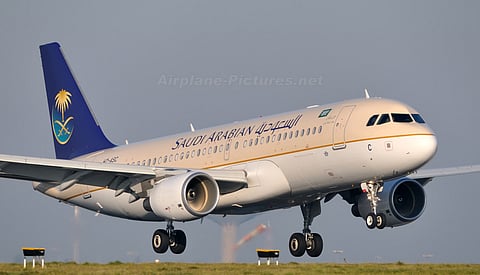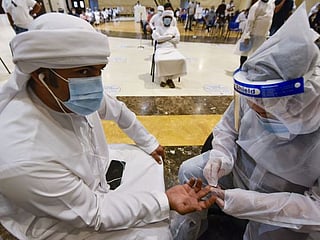Saudi Arabia must speed up return of air travel
Sure precautions need to be there, but too long a wait will be detrimental

Also In This Package
While neighbouring UAE is open for business, the drawbridge to Saudi Arabia remains up with an aviation industry still reeling from the impact of the pandemic.
Saudi Arabia’s total seat capacity outlook for 2020 was expected to be nearly 145 million seats. Cncellations in flight schedules between February and April have already hampered this forecast.
By the end of this year, a capacity loss of 25 per cent in Saudi Arabia is forecasted. In a worst-case scenario, the impact could be as high as 35 per cent, leaving Saudi’s carriers dealing with an increasing level of complexity in their networks, since many governments are still getting to grips with their COVID-19 strategies related to international travel.
The Kingdom is planning to lift all travel restrictions on air, land and sea transport for citizens in January 2021. Before the pandemic, Saudi Arabia was moving at full speed and achieving tangible results in modernisation, infrastructure development and economic growth. In alignment wit Vision 2030 strategy, Saudi Arabia was witnessing a sharp increase in tourism as it has been working towards revamping its tourism and entertainment offerings by promoting its stunning coastline and UNESCO heritage sites.
Summer offers a glimpse
The Vision 2030 strategy serves as a blueprint to improve the quality of life and investment in the Kingdom. With new types of tourist activities available, the aspirations of Saudis are expanding, even during this year’s summer season which coincided with COVID-19. Domestic tourism flourished while precautionary measures were maintained to ensure the safety of tourists.
Saudi Summer, the kingdom’s largest ever domestic leisure tourism campaign from the Saudi Tourism Authority (STA), has boosted tourism spending to 6 billion riyals ($1.6 billion) during the first-half of the initiative. Spending on recreation and cultural activities exceeded 1 billion riyals, an increase of 25 per cent over 2019. Spending at restaurants amounted to 3.8 billion riyals, an increase of 38 per cent over last year.
The foundation has already been laid for the arrivals of international tourists and business travellers. However, the country still has remained closed to international visitors to date.
Get moving
That said, a multilateral approach and close collaboration between all stakeholders in Saudi Arabia, and an unwavering commitment to aviation are essential during these critical times to restore international travel as early as possible.
The Saudi government has an opportunity to align risk-based, practical measures to allow the aviation industry to restart in a coordinated manner, while reassuring travellers, particularly business passengers. The UAE quickly recognised this threat, reopened its borders to the majority of countries, including the US, when it was safe to do so.
This is an important consideration to avoid losing a large share of business and leisure travel to eighbouring countries in the short- and medium-term. Strategic creativity thrives in environments that support it. Collective action and collaborating to overcome this crisis will be important to withstand the pandemic effects on travel.
Safety first
Integrating COVID-19 testing into airports across the Kingdom, at check-in, could help reassure passengers at a time when health and safety are a primary concern. By focusing on medium-high risk countries or cities (with mutual acceptance of results), it could make travel more seamless for some.
For passengers arriving into Saudi Arabia from high-risk countries, a combination of COVID-19 testing and a short quarantine until the verification of their results should be required.
In the past few months, we’ve witnessed that fear and trust are at the forefront of people’s minds when planning a trip. Therefore, regular communication of travel information from airlines and airports to the public in close cooperation with stakeholders is essential for boosting reassurance among travellers and staff.
Through the establishment of air bridges between Saudi Arabia and safe countries (“travel corridors”), the removal of the need for quarantine when travelling (e.g. business travel) shall be on the top of the agenda of the Saudi government. By establishing the air bridge model and extending protection beyond it to destination services, Saudi Arabia could bring back a feeling of the “Old Normal” and save thousands of jobs by restoring the economy.
These steps will help the Saudi Arabia effectively reset its aviation industry while boosting air travel confidence.
Having a large and diverse domestic market can be considered one of the competitive advantages for Saudi carriers. The recovery of a country’s airline industry will have a lot to do with the size of its domestic travel market. Countries that lack large domestic travel markets are likely to recover slower from the crisis and may open to travellers from safe countries first.
In the post COVID-19 era, an increase in demand for domestic travel and domestic feeder services for long-haul flights out of Riyadh and Jeddah can be expected, driven by the increasing point-to-point traffic, the fast-changing customer behaviour of health-conscious passengers, and the economic advantages associated with flying efficient, twin-engine long-range aircraft with lower cabin density.
In total, 5.6 per cent of Saudi Arabia’s GDP was supported by revenues from the air transport sector and foreign tourists arriving by airplane. The increased demand in the post COVID-19 era would support approximately $82.3 billion of GDP and almost 1.2 million jobs, directly and indirectly.
Fully supporting the aviation and tourism sectors now means a stronger recovery for the Kingdom. Undoubtedly, it will recover but it takes require strategic creativity and a multilateral approach that combines vision, creativity, compromise, commitment, discipline, operational acumen, and leadership - combined with continuous precautions.

- Linus Benjamin Bauer is Managing Director at Bauer Aviation Advisory and visiting lecturer at City University of London.
Sign up for the Daily Briefing
Get the latest news and updates straight to your inbox









